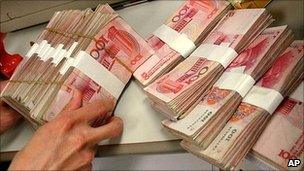China cuts bank reserve ratio from record high
- Published

China had been increasing banks' reserve rates to try and tackle rising prices
China has said it will cut the limit on the amount of cash the country's banks have to hold in reserve, a move designed to encourage more lending.
In an unexpected move, China's central bank said it would reduce the reserve limit from its record high of 21.5% to 21% on 5 December.
The bank had been increasing the rate to reduce lending by banks in order to dampen demand and tackle rising prices.
The cut therefore marks an important change in policy, analysts said.
"It's a surprising move - the market was not expecting the central bank to [cut the reserve rate] so fast," said Shi Chenyu at the Industrial and Commercial Bank of China.
"The move sends a clear message that the central bank is ready to relax its policy stance."
The move pushed European markets higher on Wednesday, after they had begun the day by falling back.
Mark Williams at Capital Economics said the move was a "decisive shift in policy stance from China".
"Further reserve requirement cuts will follow over the next few months. Bank lending will pick up".
Private loans
Some commentators also suggested the move could be part of a wider effort by Chinese authorities to combat underground lending.
Last month, the China Banking Regulatory Commission said it was looking to curb the rise of shadow banking and private lending in the country.
Some estimates put private loans, where rich individuals and businesses rather than banks lend money, at 4 trillion yuan ($627bn; £402bn).
The loans often come with exorbitant interest rates of up to 70%.
- Published15 November 2011
- Published21 October 2011
- Published20 October 2011
- Published14 June 2011
- Published13 June 2011